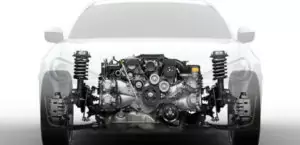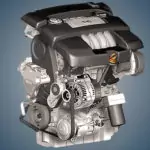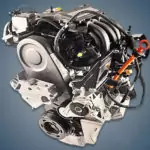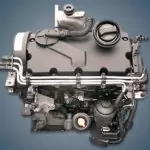The 1.6-liter Volkswagen BLF 1.6 FSI engine was produced by the concern from 2004 to 2008 and was installed on a number of popular company models, such as Golf 5, Jetta 5, Touran or Passat B6. Also, this direct injection engine is often found under the hood of the Skoda Octavia.
The EA111-FSI series includes: ARR, BKG, BAD, BAG, BLF.
Specifications
| Production years | 2004-2008 |
| Displacement, cc | 1598 |
| Fuel system | direct injection |
| Power output, hp | 116 |
| Torque output, Nm | 155 |
| Cylinder block | aluminum R4 |
| Block head | aluminum 16v |
| Cylinder bore, mm | 76.5 |
| Piston stroke, mm | 86.9 |
| Compression ratio | 12.0 |
| Features | DOHC |
| Hydraulic lifters | yes |
| Timing drive | chain |
| Phase regulator | on the intake shaft |
| Turbocharging | no |
| Recommended engine oil | 5W-30 |
| Engine oil capacity, liter | 3.6 |
| Fuel type | petrol |
| Euro standards | EURO 4 |
| Fuel consumption, L/100 km (for VW Jetta 2008) — city — highway — combined |
9.6 5.5 7.0 |
| Engine lifespan, km | ~250 000 |
The engine was installed on:
- Audi A3 2 (8P) in 2004 – 2007;
- Skoda Octavia 2 (1Z) in 2004 – 2008;
- Volkswagen Eos 1 (1F) in 2006 – 2007;
- Volkswagen Golf 5 (1K) in 2004 – 2007;
- Volkswagen Jetta 5 (1K) in 2005 – 2007;
- Volkswagen Passat B6 (3C) in 2005 – 2008;
- Volkswagen Touran 1 (1T) in 2004 – 2006.
Disadvantages of the VW BLF engine
- Owners of cars with such an engine often complain about poor starting in cold weather.
- From carbon formation, the intake valves, throttle and EGR valve stick here.
- Timing chain stretches quickly and may jump after parking in gear.
- Ignition coils, a thermostat, a phase regulator also have a low resource.
- Already after 100,000 km of run, rings often lie down and an oil burn begins.






